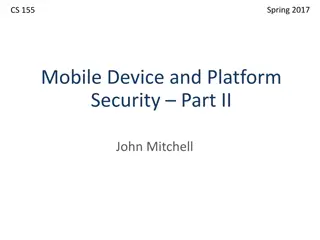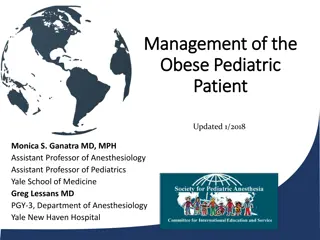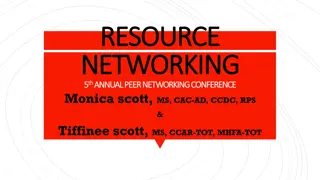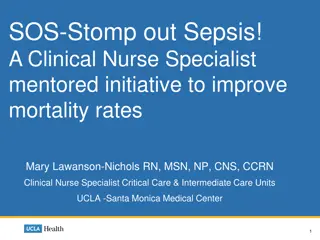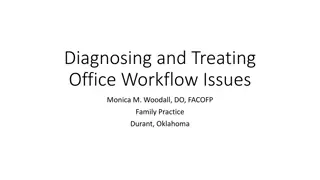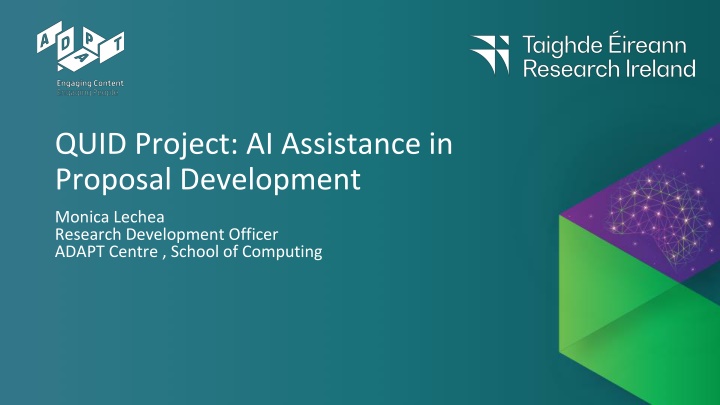
Emerging Concerns in the Use of Generative AI Models
This proposal development project focuses on AI assistance in proposal development led by Monica Lechea, a Research Development Officer at the ADAPT Centre, School of Computing. The project has received funding and has participated in key workshops and congress events related to Generative AI. It explores the differences between Generative AI and Large Language Models (LLMs) and highlights the risks associated with using models like ChatGPT and Mistral. Concerns include data privacy, ownership, compliance issues, biases, and energy consumption. The project emphasizes the importance of cautious usage and transparency when employing such AI models.
Download Presentation

Please find below an Image/Link to download the presentation.
The content on the website is provided AS IS for your information and personal use only. It may not be sold, licensed, or shared on other websites without obtaining consent from the author. If you encounter any issues during the download, it is possible that the publisher has removed the file from their server.
You are allowed to download the files provided on this website for personal or commercial use, subject to the condition that they are used lawfully. All files are the property of their respective owners.
The content on the website is provided AS IS for your information and personal use only. It may not be sold, licensed, or shared on other websites without obtaining consent from the author.
E N D
Presentation Transcript
QUID Project: AI Assistance in Proposal Development Monica Lechea Research Development Officer ADAPT Centre , School of Computing
AI Assistance in Proposal Development Total amount of QuID 2024 funding received: 1,500 Attended Online EARMA AI Day & GenAI models for Research Development workshop Develop Guidelines on Generative AI Models for Research Development Abstract accepted for International Network of Research Management Societies (INORMS) Congress Co-hosted workshop on Generative AI in Research Management (Aug 2024) 1
Generative AI vs LLMs Generative AI encompasses a broader category of AI models designed to create new content across various domains, including text, images, audio, video, and more. These models learn patterns from large datasets and use that knowledge to produce original output A Large Language Model (LLM) is a specific type of AI model designed to understand, interpret, and generate human language. LLMs are trained on vast amounts of text data to predict the likelihood of sequences of words. 2
Concerns associated with the use of Generative AI models like ChatGPT, Mistral etc There are significant risks associated with using Large Language Models (LLMs) like ChatGPT and Mistral, especially those based outside the EU, including data privacy, ownership, and transparency issues. GDPR Compliance: It is unclear whether the General Data Protection Regulation (GDPR) apply to LLMs based outside the EU, making them potentially unsafe for intellectual property (IP) issues. Right to Forget: LLMs do not offer the "right to forget," meaning data cannot be removed once it is inputted. Data Ownership: Data inputted into LLMs may be used for training, resulting in the loss of ownership of that data. Closed Source Models: Many private LLMs are closed source models which means they are not recommended due to the lack of transparency in their construction and the data used, posing a high risk. Biased Data: There is a risk that the data used to train LLMs may be biased, leading to biased outputs. Inaccuracy of Outputs: The outputs generated by LLMs may not always be accurate, which can affect the reliability of the information provided. High Energy Consumption: The use of LLMs consumes a significant amount of energy. A single LLM interaction may consume as much power as leaving a low-brightness LED lightbulb on for one hour. 3
ChatGPT (https://chatgpt.com/) ChatGPT is a large language model developed by OpenAI (USA) Using ChatGPT to reformat a document into tables 1. 2. Closed source so not transparent Not GDPR compliant since its based in the USA and the data inputted is subject to the Patriot Act It does sell your data to third parties and uses it for training future models Therefore ChatGPT s use must remain limited to publicly available, non-sensitive information to mitigate privacy and security risks. 3. 4. However the free version has some useful capabilities for publicly available content by enabling users to upload large documents and ask it to summerise/analayse/reformat content For example, users can upload a Horizon Europe Work Programme and ask it to summerise and reformat content into tables 4
Mistral (https://chat.mistral.ai/chat) Mistral is a Large Language Model (LLM) developed by Mistral AI, a company based in Paris, France. Using Mistral to draft text for the Artificial Intelligence section on Horizon Europe proposal using the MSCA Handbook instructions. Open source GDPR compliant Does not sell user data to third parties and doesn t use inputted data for training its LLM. Can be used to draft proposal text, summarize, sense check against funder guidelines and requirements Limited functionality in terms of being upload documents in the free version which makes it impractical for some things. Start User Prompt Draft a paragraph on the use of Artificial Intelligence based on the following guidelines [COPY & PASTE GUIDELINES] Caution: Privacy terms are subject to change! Note Provides very general text and can make erroneous judgments User needs to provide more detailed information on the technical methods, risk classification, management systems, and specific expertise involved. using the following information ' [add summary of the proposal] ' End User Prompt 5
Use of generative AI in Research Development Generative AI models like Mistral and ChatGPT offer significant potential to enhance research development by automating tasks such as summarizing content, brainstorming ideas, and reformatting documents, their use comes with substantial risks and ethical considerations. Key concerns include data privacy, ownership, transparency, bias, inaccuracy, and high energy consumption. To leverage these tools effectively, it is crucial to use them judiciously, ensuring compliance with regulations like GDPR, validating outputs for accuracy, and limiting their application to non-sensitive information. By doing so, we can harness the benefits of generative AI while mitigating associated risks and upholding ethical standards. 6
Thank you Monica Lechea monica.lechea@adaptcentre.ie 7






